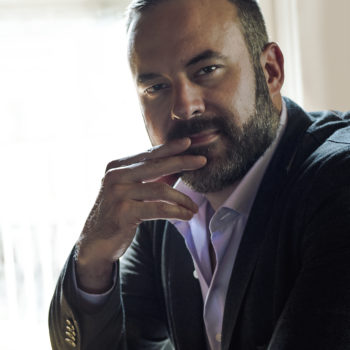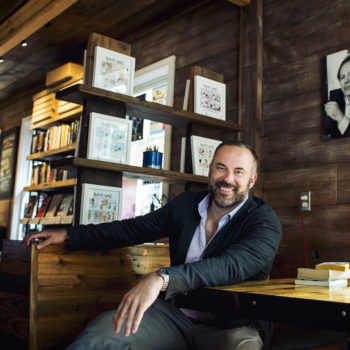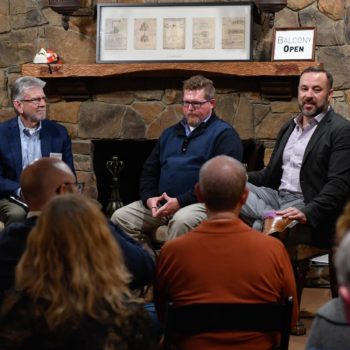How Theater, Fitness, the Military, and Liberty Intersect: A Profile of Brian Wilson
 As an entrepreneur and Marine Corps veteran, Brian Wilson has made a career of helping others grow, both physically, through founding and leading several CrossFit gyms, and intellectually, through his teaching, podcast, and seminars. And through his role on the AF board of directors, he’s helped liberty-lovers across the country build strong communities. We had the opportunity to discuss Brian’s career and his journey to libertarianism. Check out his story.
As an entrepreneur and Marine Corps veteran, Brian Wilson has made a career of helping others grow, both physically, through founding and leading several CrossFit gyms, and intellectually, through his teaching, podcast, and seminars. And through his role on the AF board of directors, he’s helped liberty-lovers across the country build strong communities. We had the opportunity to discuss Brian’s career and his journey to libertarianism. Check out his story.
Josh Evans: How did you first get involved in the liberty movement?
Brian Wilson: The first step in dealing with a problem is admitting it, so for the first time in public I will admit that in my early 20’s I had a debilitating addiction…and it was C-Span. I would plan my days around press conferences and Senate hearings. I would drive around on Sunday afternoon because C-Span radio would replay the Sunday morning political talk shows. If they would have sold Brian Lamb posters, I would have had one (I had to settle for his books instead).
At some point around 2004-2005 I caught Ted Galen Carpenter from The Cato Institute talking about the Iraq War on C-Span. At the time I was an active duty Marine Corps officer and was itching to get to Iraq or Afghanistan (and was generally supportive of both wars). Mr. Carpenter was talking about the practical necessities of ending the occupation of both countries. So spurred on by some mid-20’s “I know everything about everything” chutzpah, I emailed him and David Boaz and told them in fairly pointed terms something along the lines of “these wars are a moral imperative and practical considerations shouldn’t outweigh the moral necessity of freeing the Afghan and Iraqi peoples.”
20-something Brian was adorable…..
Well Mr. Boaz replied to my email with something that was both thoughtful and non-combative (alas, I have lost my password for [email protected] and so can’t pull the exact email) and I saw that he had a book called “Libertarianism: A Primer.” It was also along this point (after watching too much C-Span) that I was trying to find books about the fundamental principles of the Democrat and Republican parties. I was a bit confused as to what these parties stood for as their bedrock principles, especially the Republicans under George W. Bush, whose first act in office was to pass steel tariffs and then joined Ted Kennedy in supporting the Medicare Part B bill.
So after spending a lot of time looking for a book that laid out “this is what Republicans believe” by a Republican or “this is what Democrats believe” from a Democrat and not finding anything, I said to myself “Self, let’s read this Libertarianism thing.”
 JE: Can you tell me a bit about your career path and how you got to where you are now?
JE: Can you tell me a bit about your career path and how you got to where you are now?
BW: For some wacky reason I wanted to be a Marine. Still not sure why, but that’s what I wanted to do. So I applied and was accepted to the Naval Academy and then commissioned as a Marine Officer in 2000. I was assigned as a Counterintelligence Officer shortly after 9/11. I deployed to Bosnia, Horn of Africa, and Iraq and did normal counterintelligence stuff and then left active duty because I needed a bit of a break, and because I wanted to attend St. John’s College in Annapolis, Maryland. So I got a job working as a defense contractor for a Naval Special Warfare support organization as a Human Intelligence Subject Matter Expert and was doing that during the day while I went to St. John’s at night and sat around talking about Plato and Shakespeare.
I was on my way back to Iraq in 2006 for a short trip and stopped in Bahrain where the SEALs had a Task Unit and my boss and I were getting the dog and pony show, and then our guide was like “OK, I’m going to hand you over to Petty Officer Smith who’s going to take you to lunch, we’re going to go PT (aka workout).” As a 27 year old former Marine I was like “I can totally hang with you guys PT” so I asked to come along and they told me “No way, we do CrossFit, it will kill you.”
My delicate ego was shocked and appalled by this reaction. I checked out the CrossFit.com website, found a gym back in DC near my house, and started going there and was pretty immediately hooked. However, at the time, CrossFit DC was in a tiny personal training studio with limited space and equipment, so I pitched the owner on letting me bank roll finding a new location and helping him search. So I found a place in Arlington, but he didn’t want to move that far. So I contacted a buddy of mine who I had introduced to CrossFit and had gone to high school and college with and asked him if he’d like to partner up to open a CrossFit gym.
We opened the first CrossFit in Arlington, Virginia, in 2008, which led to opening a second in 2011 (as well as a non-profit CrossFit gym at Walter Reed Military Medical Center with one of my clients at the time who was a former Green Beret and Silver Star awardee in 2010).
That led me to working with Territory Foods, which was started in DC in 2010 and served meals at CrossFit gyms. So I was their launch guy in 2015-2016 and opened their San Francisco and Dallas branches, and now I run the Dallas branch.
JE: You’ve founded several crossfit programs in the DC area; how does this focus on fitness fit in with your life and goals?
BW: I think the thing that Iraq really brought to light for me is that I really like to help people live happier and healthier lives. So getting introduced to CrossFit, and it being a very welcoming entrepreneurial system, allowed me to do that. Working with Territory Foods is an extension of that need.
 JE: You’re also quite involved in theater, both reviewing and teaching. What drew you to that area?
JE: You’re also quite involved in theater, both reviewing and teaching. What drew you to that area?
BW: I was an avid theatergoer in DC. I grew up in middle-of-nowhere Maryland, but my sister was a theater major at the University of Maryland and then a working actor in DC, so occasionally between deployments I’d go see one of her plays. When I got off active duty in 2006 I really wanted to drink up the cultural events offered in DC. So I started attending the Folger Theater, Shakespeare Theater, Kennedy Center, etc., and just really fell in love with the performing arts. Especially since I was familiar with a lot of the texts through St. John’s.
When I moved to Dallas, I found out about Shakespeare Dallas (and was at first shocked such a thing existed). I went to their season premiere in 2016 with a friend of mine I had met at a Shakespeare Dallas Pub Crawl, and he told me a friend of his was in from out of town and used to be in the Navy and was coming to the show. So I got introduced to this random guy, Lance, and we began the usual inter-service rivalry, but I also mentioned I went to the Naval Academy. He replied that he had gone to school across the street at St. John’s.Pretty crazy coincidence.
So then randomly he asked “have you ever thought about writing theater criticism?” And I replied, “Lance, I’ve been waiting my whole life for somebody to ask me that question.” He had been the Shakespeare beat writer for the local theater magazine here in Dallas, intro’d me to the editor the day after the play who then asked me “Can you write a review of the play last night?”
And the rest is kind of history. It’s a great gig as I get to go to pretty much any show I want, and I get paid to write about theater (which is kind of shocking as it’s like having somebody who’s driven a car a few times write car reviews about people that have been building cars their whole lives). But it’s led me to get the opportunity to direct a few things and the theater community down here is super weird (in a good way).
JE: You also co-host the Combat and Classics podcast, focusing on leadership development for current and former US military members; what motivated you to help start that?
BW: That really started over coffee with the Dean of St. John’s College Graduate Institute. I was getting ready to graduate, asked him to coffee and just told him “I’m going from student to alumnus, so what can I do for you?” He told me that he’d really like to get more veterans in the door at the college. So we started travelling to military bases and holding seminars. Our first one was at Marine Corps Base Quantico, and we rustled up some people at lunch on a Wednesday to talk about two chapters of Machiavelli’s “The Prince.” I was blown away by how engaged and interested everybody was.
So we started doing online seminars and podcasts, and we just held our first two dramatic readings of classical Greek tragedies centered on veterans (inspired by Theater of War).
We have a dedicated following that really digs what we’re doing, and I’m really proud of the content and work that we’ve done through this program.
JE: What kind of impact have you seen from your podcast and seminars?
BW: Oy, that’s a tough thing to answer. I mean we average 1000 downloads per episode, which in general podcast terms is pretty small, but in terms of there are 1000 people interested in this approach to learning and gain something, whether intellectually or emotionally, from this type of content, that’s pretty great.
And things build on each other. I got the dramatic reading gigs because I had the podcast. This allows us to broaden our audience. I think it’s important that civilians gain a better understanding of the veteran experience as well, even if they aren’t interested in a close study of classical literature through a pod.
So the impacts have been, in my opinion, opening the door for active duty and veterans to explore books and ideas they otherwise wouldn’t have been exposed to and help the civilian population gain a better understanding the veteran experience.




